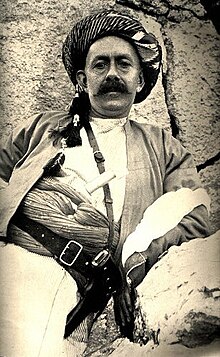Shaykh Mahmud Barzanji, the first leader of the Peshmerga.
"During the US led invasion of Iraq the Peshmerga was directly responsible for the capture of Saddam Hussein. They also captured al-Qaeda chief Osama Bin Laden's messenger in 2004, which led to the slaying of Bin Laden."
***
Peshmerga
Wikipedia
***
As an ally of the US-led coalition, Peshmerga forces fought side by side with American troops in the 2003 Iraq War in Iraqi Kurdistan. Since that time the Peshmerga have assumed full responsibility for the security of the Kurdish areas of Northern Iraq. In late 2004, when Arab Iraqi Police and ING (Iraqi National Guard) units in the city of Mosul collapsed in the face of an insurgent uprising, Kurdish Peshmerga battalions, who had recently been converted into ING forces, led the counter-attack alongside US military units. To this day, there are a number of Kurdish battalions of former Peshmerga in the Iraqi Army serving in Northern Iraq. These unit are mostly part of the reformed 2nd Division (Iraq), stationed in Mosul.
In early 2005 it was speculated by Newsweek magazine that Peshmerga forces would be trained by the US to take on Sunni rebels in Iraq.
It was estimated that in 2005 there were 180,000 Peshmerga fighters in Iraqi Kurdistan, the article estimating their number to be 270,000 in total. A recent CBS News report places their number at 375,000.[citation needed]
In 2008 many Peshmerga soldiers were put into new formations under the interior ministry, one of which are the Zeravani whom are loyal to the Kurdistan Democratic Party. Back in 2008, the Zeravani was a force of 8000 soldiers, but have grown in numbers (to 25 000 as of 2011) and now operate seven bases inside Iraqi Kurdistan. One of the bases is a dedicated airbase for training on ultralight fixed-wing aircraft (Ikarus C42). The Zeravani forces are led by Brigadier General Aziz Waysi Bani.
The Peshmerga were an active partner in the American-led coalition in Iraq. Many Peshmerga are fluent in Arabic, in contrast to foreign coalition troops, and they therefore played an important role in the Sunni triangle of Central Iraq. On the strategic level the Peshmergas are ready to fight a guerrilla war of any invasion of Iraqi Kurdistan...
The Peshmerga have traditionally had a problem with funding, mainly due to their large size. The Peshmerga forces had no live training on their heavy weapons up until 2011 due to lack of ammunition. The problem was tackled after it was put on the media spotlight. Now all heavy weapon-formations have at least 320 hours of live-fire training and taken part in six large military exercises

No comments:
Post a Comment